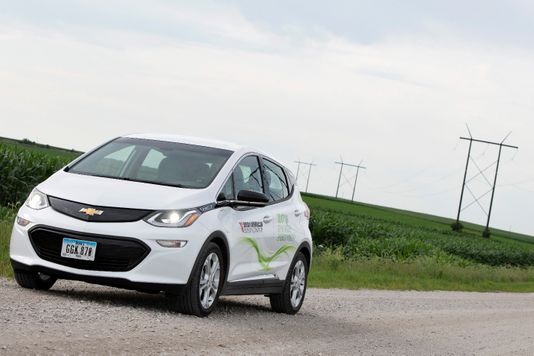
Each year, as the latest car and truck models roll out, many businesses and consumers shop for new vehicles. Today, manufacturers offer a number of car and truck models powered in full or in part by electricity. Known for their environmental friendliness, decreased operating costs, reduced need for maintenance, plus ease of use, electric vehicles earn praise from their users.
“I drive an electric vehicle every day at work, and they’re an important part of our business, because they’re an efficient way to travel,” said Jim Dougherty, vice president of electric delivery for MidAmerican Energy Company. “They provide good performance and require less maintenance than gasoline-powered vehicles, so we’re able to spend more time on the road and less time servicing them. Electric vehicles help us quickly, efficiently and reliably serve our customers across our service territory.”
Clean, renewable wind energy helps power electric vehicles
Electric vehicles — known as EVs — get all or part of their power from electricity that comes from the electric grid. In Iowa, that includes environmentally-friendly renewable energy generated by the wind and supplied by MidAmerican Energy as part of its energy mix. In fact, in 2017, the company provided its customers in Iowa with 50.8% of their electricity from renewable resources.
Electric vehicles help reduce fuel costs, emissions
Using electricity from the grid to power vehicles reduces fuel costs, cuts petroleum consumption and reduces tailpipe emissions compared with conventional vehicles, according to the Office of Energy Efficiency and Renewable Energy, an office of the U.S. Department of Energy.
So what are the main types of electric vehicles, and what should you consider as you evaluate if an electric vehicle is right for you?
Two primary types of EVs
The two primary types of EVs include AEVs (all-electric vehicles) and PHEVs (plug-in hybrid electric vehicles).
AEVs run on electricity and get their power from one or more electric motors. AEV operators simply plug in the vehicle to charge it. Power is stored in the vehicle’s battery. The distance an electric vehicle can travel on a charge varies by model. Most can travel from 80 to 100 miles, while some higher-end models can cover about 250 miles on a charge. Charging time can vary, depending on the EV model and equipment involved — fast charging is about 30 minutes, while longer charging can take up to a day.
If you regularly travel long distances greater than all-electric vehicles can cover on a single charge, there’s another option to consider.
Plug-in hybrid electric vehicles — called PHEVs — use batteries to power the electric motor. Hybrid plug-in electric vehicles can also use gasoline, or gasoline blends like ethanol, to power the engine. PHEVs run on electricity when traveling shorter distances — for example, 6 to 40 miles — and then switch to an engine powered by fuel, once the electric-charged battery drains.
Three ways to charge your electric vehicle
What does it take to charge an electric vehicle? That depends on the type of vehicle. Battery chargers are usually installed in the EV. Review your owner’s manual or consult with an electric car dealer for more specifics on how to charge your electric vehicle. Generally, the more powerful the electric current, the faster the electric vehicle can charge.
The three primary ways to charge electric vehicles include:
- Level 1 uses a standard 120-volt AC (alternating current) outlet. Most plug-in electric vehicles require about eight to 12 hours to fully charge.
- Level 2 uses a 240-volt-rated charging station. Charging typically takes four to eight hours.
- Level 3 uses a 480-volt DC (direct current) connection for fast charging in about 30 to 45 minutes.
Charging your vehicle
So when’s the best time to charge your vehicle? When it’s convenient for you.
If you’re a MidAmerican Energy customer, contact the company to learn about rate options. If you have the ability to shift significant electric use, including electric vehicle charging, to nights and weekends, when electric demand is typically lower, you may be able to achieve savings. Residential customers can call 888-427-5632 or business customers can call 800-329-6261. Or visit MidAmericanEnergy.com for more information.
